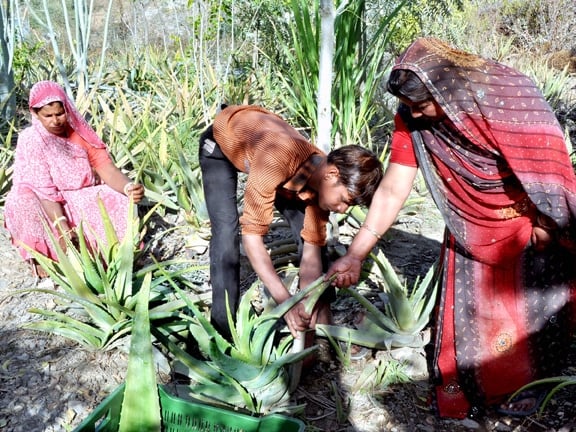
by Purnima Ramakrishnan | Jul 23, 2013 | Casting a Wider Net, Economy, Education, Feminism, Government, Human Rights, Humanity, India, Inspirational, International, Motherhood, Nature, Purnima, Social Good, The Alchemist, United Nations, Women's Rights, World Moms Blog, World Voice
A couple of weeks ago, we featured a remote village, Piplantri (Western India) on the Gates Foundation. Piplantri is a model village, whose actions of change have been very well received all over India.

Aloe Vera products from the small scale industries
They plant 111 trees for every girl child who is born, create a fixed deposit of INR 31,000 (approx. USD 620) in her name which attains maturity when she is 18 years old and chalk up a legal agreement between the parents of the girl child and the government that they won’t get their girls married off before she is 18 years old. They also have Aloe Vera industries in which the women of the village are employed. So they have achieved MDGs #3 (promote gender equality and empower women), #4 (reduce child mortality), and #7 (ensure environmental sustainability) at one go. Today on the blog, I would like to introduce Mr. Shyam Sundar Paliwal and his wife, Anita, who were the pioneers of this change action in their village. Anita is 42 years old, and she got married after she finished her 12th grade. It was an arranged marriage and the couple were happy.
Their first daughter Kiran was 18 years old when she passed away. She died due to dehydration. That was the turning point in their life, and they vowed to make lives of others happy.
They also have another daughter Hemanshi (22) and a son Rahul (15) who is in 10th grade. Hemanshi is married and has a child, too.
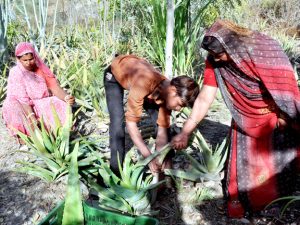
The women of the village tending Aloe Vera
Anita recalls that when she came to her in-laws place after she got married, the first lesson she received from her father-in-law was to plant banana saplings such that they bear fruits during the rainy season and then plant mango saplings around the banana trees. Banana trees absorb water during the monsoon and transfers this water to the mango trees through its roots during the arid summer season. She says she has stuck to this piece of advice to date in her village and ensured that her villagers follow such age-old farming wisdom.
Anita, who is the wife of the ex-sarpanch (ruling political head) of the village, Piplantri, is a very active community member. She is a Zila Parishad Member (Elected person of the district council). Her husband has always been supportive of her as a woman and wants her to do her best for her villagers. He has never restricted her in any way. Though she is more educated than him, he has never been jealous of her, but has only encouraged her and furthered her growth and development as an active member of their society and community. She says, if only all women of the world gets a husband like Shyam, the women of the world will be better off and we would not be speaking of women’s rights here.
Shyam Sundar won the panchayat elections in 2005 and he says he first wanted the people who worked in the government offices to be comfortable. He installed the first AC in the office, brought in some comfortable furniture and ensured that people in all echelons of the society were treated equally. (In rural India, at times, the upper caste people are given more respect and sit on chairs, whereas the lower caste people are treated shabbily and sit down on the floor. Read more about the Evils of Caste system in India here). He said, he worked on the psychology of the ruling body to make them happy and comfortable. He says, only if they are happy, they would start working on reform measures and help provide for the remaining villagers. He, at his own expense, made the offices a comfortable place to work and conducive to provide better results.
He started small. In this difficult water shortage era, he diverted the waste water from all houses/offices towards the fields. Better water conservation was ensured. If waste water does not stagnate anywhere, there would be no mosquitoes and no dengue and fewer diseases. So, he solved primarily problems with simple, cost-effective solutions.
He installed drinking RO water systems in schools. Brought in furniture for the students and made the public schools better than the expensive private schools. People started flocking towards government schools. He raised awareness slowly and in a small way, which evolved out.
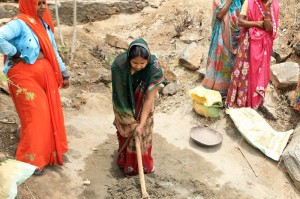
Mrs. Anita Paliwal working on the Water Harvesting Structure
He started rain water harvesting with the help of government. He built canals. He used the women of the village who were unemployed. To the left is a picture of Anita, who at times does not hesitate to get into the fields with a mean sickle. She and her husband were instrumental in starting the water harvesting structure of the village. In most of his welfare activities 90% of the employed are women and 10% alone are men. Women of the village have been blessed indeed to have him there, says Anita. In addition to 25,00,000 Aloe Vera plants, there are 10,000 rose shrubs which are also used in small-scale industries for toiletries and medicinal supplements. Women are employed in all of these schemes.
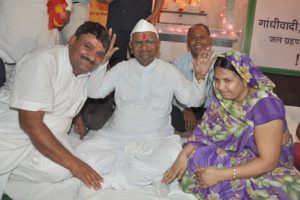
Mr. Shyan Sundar Paliwal and Mrs. Anita Paliwal with Anna Hazare
He started the Kiran Nidhi Yojna with the 76-year-old International Social Activist, Anna Hazare to ensure that no girl child is married off before 18 years old. This man who himself did not study in a college, ensures that all girl children in his village get a college degree. He also nudges the parents to get their girls married off in collective wedding, so that money is conserved and better utilised for other public welfare schemes or for their own savings. This scheme also granted government land to the parents in return for planting 111 trees on the birth of their daughter in that land, and tending to it to fruition before their girl child is 18 years old. On the death of any community member, the family is requested to plant trees again.
He says this again works on their psychology. The girl children treat the trees as their own brothers and sisters. After all, the saplings were planted on the day of their birth. And the parents get emotionally attached to the trees which came into existence on the day their family member was born or died. They then take care of it as a family member, and would under no means cut it down. He says, it is all in the hearts of the people. If people get involved with their hearts, anything is possible. He made people to get emotionally attached to nature and trees and the earth.
I learnt something new from Anita and Shyam that day – Ecofeminism. It is such a beautiful concept. Women and nature have been connected since time immemorial and this couple have harnessed it.
After all, he who was not highly educated could work on such things and make that beautiful village into a heaven, he says, the whole world could change too. And we would have no need to talk about the MDGs or uplifting of any downtrodden society/community.
When asked how he felt when his village was showcased by the Gates Foundation on their Blog, he gushed with happiness and pride. The district collector and Panchayat officials were so excited, too, he said. But his only complaint was that he could not get a hard copy of the magazine which he could show his villagers. He is so proud like a father, like the father of the heaven he created.
He also invites donation to his Kiran Yojna Scheme for the fixed deposit of INR 31000 of every girl child born in his village. He invites the contributors, readers and fans of World Moms Blog to make a trip to Piplantri. He wants people to embrace such change and for them to build upon it to suit their own society, and community.
This is an original post to World Moms Blog by Purnima, our Indian mother writing from Chennai, India. Her contributions to the World Moms Blog can be found here. She also rambles at The Alchemist’s Blog.
Photo credit to Piplantri.com
What do you think about the traditions put in place to support girls and women in the community of Piplantri?
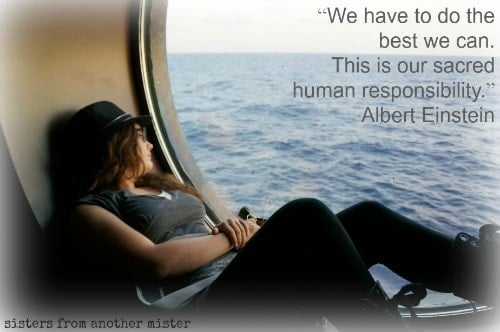
by Sisters From Another Mister | Jul 5, 2013 | Adoptive Parents, Communication, Family, Gardening, Home, Kids, Life Lesson, Motherhood, Older Children, Parenting, Women's Rights, World Motherhood

Teaching Responsibility. Responsibility comes in many forms.
I have two girls. They provide constant blog fodder. For the most part, they are okay with that. I even run certain posts by them for approval – after all, it is their story as much as it is mine.
As a parent, we get to help write the stories of our children. The ebb and flow of day-to-day becoming the chapters of their lives through experience and exposure to the world around them.
About a year ago, I wrote a post here called Raising Responsible Citizens. Raising children who are globally aware and are understanding of the need to make a difference in the world is something that is very dear to my heart. It makes me proud to say that my girls have an awareness of the plight of others and the need to be involved. They know the positivity their actions can achieve in bringing change and that their voices can indeed be heard around the world.
This post is a chapter in that book of life on responsibility…because responsibility is a funny thing. We can teach our children about the world and its people, we can teach them laws and rights, and we start when they are just toddlers with the basics of what is right and what is wrong. But what about basic responsibility…let me clarify. (more…)

Sisters From Another Mister ...
A blog born from the love of 'sisters' around the world who come together to lift eachother up no matter where they are on their life journey.
Meet Nicole, a transplanted British born, South African raised, and American made Mom of two girls living on the sunny shores of South Florida, USA. A writer of stories, an avid picture taker and a keeper of shiny memories.
Sharing the travels of a home school journey that takes place around the globe - because 'the world truly is our classroom'. Throw in infertility, adoption, separation, impending divorce (it has its own Doom and Gloom category on the blog) and a much needed added side of European humor is what keeps it all together on the days when it could quite clearly simply fall apart! This segues nicely into Finding a Mister for a Sister for continued amusement.
When not obsessing over the perils of dating as an old person, saving the world thro organisations such as being an ambassador for shot@life, supporting GirlUP, The UN Foundation, ONE.org and being a member of the Global Team of 200 for social good keeps life in the balance.
Be sure to visit, because 'even tho we may not have been sisters at the start, we are sisters from the heart.'
http://www.sistersfromanothermister.com/
https://www.facebook.com/SistersFromAnotherMister
https://twitter.com/thesistershood
http://pinterest.com/thesistershood/
Global Team of 200 #socialgoodmoms
Champion for Shot@Life and The United Nations Foundation
More Posts - Website
Follow Me:




by Mama B (Saudi Arabia) | Jul 3, 2013 | 2013, Politics, Religion, Saudi Arabia, Transportation, Travel, Uncategorized, Women's Rights, World Motherhood
 We always talk about “first world problems,” and, I, most of the time, complain about women not being able to drive in Saudi Arabia in the “first world problem” sense. “My driver is late!” or “It’s too hot in the car. I wish he’d switch on the AC before I get in” or “Why does it take so long for my driver to answer his phone!”
We always talk about “first world problems,” and, I, most of the time, complain about women not being able to drive in Saudi Arabia in the “first world problem” sense. “My driver is late!” or “It’s too hot in the car. I wish he’d switch on the AC before I get in” or “Why does it take so long for my driver to answer his phone!”
It’s easy for me to forget that for the majority of women in Saudi, it is very much a paralyzing issue. As I was leaving Saudi last week, I was in the airport lounge, and one of the women working there was having a private conversation on her mobile which got progressively louder. She kept saying, “Swear he’s ok! Why can’t I talk to him?”
After she hung up she said to me, “My son has had an accident!” I asked if he was ok. She told me she didn’t know and that someone at the scene had called her and told her about it, but they wouldn’t give him the phone and wouldn’t give her details. I asked why she didn’t just go to him, and she told me she couldn’t.
“Surely your supervisor wouldn’t have a problem with you leaving early to go there!” I said.
“I don’t have any way of getting there!”, she said. “My son is usually my driver. I don’t have brothers, and I’m divorced.”
And that’s the simple truth. Her son was on a street somewhere, in God knows what state ,and she was stuck at work. She eventually took a cab and declined the offer to use my car.
I always dread talking about women driving in Saudi because it’s been talked to death, and there’s nothing to discuss, really, since the fact that women should be allowed to drive is such an obvious one. It’s like discussing if women should be allowed to work… or walk even. Not driving means different things to different people. To me, it’s something I don’t think about on a day-to-day basis, unless we have a driver crisis. But even then, I rely on my mother’s, sister’s or brother’s driver to get me where I need to go, and I have never been stranded at home or elsewhere because of it. I forget that this is not the case for everyone.
Yes, some of my friends can’t do lunches on certain days because of the driver issues (lack of reliable ones or lack of ones all together), so when their husbands work they have to stay home. While many, many Saudi families have a driver working for them, not all of them do. And honestly, who cares if I can’t get to my family visit on time or to the shops before they close, when this mother couldn’t get to her son, who I pray was not badly injured in this accident.
And if, God forbid, he was badly injured, or worse, and he is her only “mahram” (male guardian), then she effectively has to put her life on hold till he gets better. And if it’s not a “getting better” situation, then she is stuck. Driving will be only one of her problems.
We do have taxis, which are generally decent, but many women don’t like to use them or the men in their lives don’t like them to. Which is all fine and dandy if these men are willing to be their wives’ personal chauffeurs, but if they refuse, then the women are stuck. But they do sometimes say “no,” and their wives, sisters, daughters comply. I have never really asked my husband how he would feel about me riding a taxi, since there never was a need to before, but I know that even if he didn’t want me to ride one, for what ever reason, he would never tell me I couldn’t.
Work has already begun on the metro system in Riyadh, and I am assuming that it will have a similar set up to Dubai, where there is a women’s tram. (Although in Dubai it is optional to go on that tram.) It will be interesting to see what we end up with, but is public transportation the answer to this problem? No.
Women being allowed to drive is a change that has to happen. It’s going to happen. I can guarantee that, but when? And the assumption that this is a governmental decision is totally wrong as the government is doing what the majority of the population wants.
When the subject of women driving is raised, it is always surprising how many people are against it. Women included. When they decided to introduce girls’ schools, the community also spoke out against it and were fearful and pessimistic. But the government just made the change, and the people got used to it. Now more than half the college graduates in Saudi are women! So, I hope we just rip the band-aid off.
And maybe the people will come around eventually and want this change, but how long do we want to wait? So many changes have come into our country, culture and environment that people are afraid to open up anymore, but there will be no progress without it.
Maybe I am wrong though. Maybe the views have changed, but the loudest voices are still of those who are against this. In Saudi the moderate voice is the one that talks at home among friends but doesn’t really rock the boat. The extreme views tend to be loud and very well organised.
A little side note to mention is there is no law against women driving. But there is a law against driving without a license, and women can’t get their licenses in Saudi.
It should just be done! Just as the 30 women were elected into the shours counsil by royal decree one morning, this change can happen too. It would, by no means, be mandatory, and whoever doesn’t want to drive, doesn’t have to. But for the women who are paralyzed, stuck and unable to get to their sons when they are hurt, a key to a car is not much to ask.
Do you agree with me that sometimes making unpopular decisions that will better your country is ok? Or is the government’s duty? Or do you think what the people want is more important?
This is an original post to World Moms Blog by Mama B from Saudi Arabia. She can be found writing at her blog, Ya Maamaa.
Photo credit to hhdoan who holds a Creative Commons Attribution license.

Mama B’s a young mother of four beautiful children who leave her speechless in both, good ways and bad. She has been married for 9 years and has lived in London twice in her life. The first time was before marriage (for 4 years) and then again after marriage and kid number 2 (for almost 2 years). She is settled now in Riyadh, Saudi Arabia (or as settled as one can be while renovating a house).
Mama B loves writing and has been doing it since she could pick up a crayon. Then, for reasons beyond her comprehension, she did not study to become a writer, but instead took graphic design courses. Mama B writes about the challenges of raising children in this world, as it is, who are happy, confident, self reliant and productive without driving them (or herself) insane in the process.
Mama B also sheds some light on the life of Saudi, Muslim children but does not claim to be the voice of all mothers or children in Saudi. Just her little "tribe." She has a huge, beautiful, loving family of brothers and sisters that make her feel like she wants to give her kids a huge, loving family of brothers and sisters, but then is snapped out of it by one of her three monkeys screaming “Ya Maamaa” (Ya being the arabic word for ‘hey’). You can find Mama B writing at her blog, Ya Maamaa . She's also on Twitter @YaMaamaa.
More Posts

by Elizabeth Atalay | May 28, 2013 | 2013, Birthing, Clean Birth Kits, Contraception, Social Good, Social Media, Women's Rights, World Events, World Moms Blog, World Voice
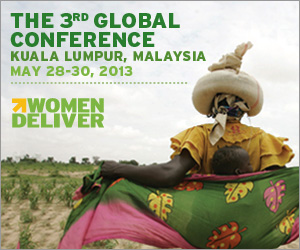
Beginning today in Kuala Lumpur the world gathers at the Women Deliver conference, the third global conference to be held focusing on the health and well-being of girls and women. Starting today and running through May 30th International leaders, policymakers, healthcare professionals, NGO’s, youth leaders, corporations, and media outlets recognize the value of girls and women and take on solutions to issues affecting girls and women around the world. It is becoming increasingly clear that the most valuable investment we can make is in girls and women.
With the 2015 Millennium Development Goal deadline rapidly approaching, the time is now to deliver for girls and women, and Women Deliver 2013 will serve as a global platform for ensuring that the health and rights of girls and women remain top priorities now, and for decades to come.
Luckily we do not have to travel to Malaysia to participate; You can watch the conference livestream or go back to find the sessions that have been recorded that you may have missed. You can chime in or follow using the hashtag #WD2013 on twitter, and get the days re-cap by looking through #WDLive.

The +Social Good community also launched in Kuala Lumpur this week, and was inspired by the Social Good Summit, as a community of innovators, connectors and global citizens come together with the shared vision to make the world a better place. There are many ways to join in on the global conversation this week around women, girls and social good, we’ll see you there!

Elizabeth Atalay is a Digital Media Producer, Managing Editor at World Moms Network, and a Social Media Manager. She was a 2015 United Nations Foundation Social Good Fellow, and traveled to Ethiopia as an International Reporting Project New Media Fellow to report on newborn health in 2014. On her personal blog, Documama.org, she uses digital media as a new medium for her background as a documentarian. After having worked on Feature Films and Television series for FOX, NBC, MGM, Columbia Pictures, Warner Brothers, 20th Century Fox, and Castle Rock Pictures, she studied documentary filmmaking and anthropology earning a Masters degree in Media Studies from The New School in New York. Since becoming a Digital Media Producer she has worked on social media campaigns for non-profits such as Save The Children, WaterAid, ONE.org, UNICEF, United Nations Foundation, Edesia, World Pulse, American Heart Association, and The Gates Foundation. Her writing has also been featured on ONE.org, Johnson & Johnson’s BabyCenter.com, EnoughProject.org, GaviAlliance.org, and Worldmomsnetwork.com. Elizabeth has traveled to 70 countries around the world, most recently to Haiti with Artisan Business Network to visit artisans in partnership with Macy’s Heart of Haiti line, which provides sustainable income to Haitian artisans. Elizabeth lives in New England with her husband and four children.
More Posts

by Mannahattamamma (UAE) | May 22, 2013 | Body Image, Cultural Differences, Feminism, Human Rights, Religion, SAHM, Sex, Tunisia, UAE, Womanhood, Women's Rights, World Events, World Voice
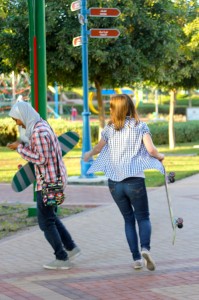 I used to have a college professor—of women’s studies, of course—who would occasionally start class when we were particularly chatty and inattentive by saying, loudly, “SEX!” Our heads would whip around to stare at her and the room would be silent.
I used to have a college professor—of women’s studies, of course—who would occasionally start class when we were particularly chatty and inattentive by saying, loudly, “SEX!” Our heads would whip around to stare at her and the room would be silent.
The professor would chuckle and then start the lesson, which almost never had anything to do with sex—or at least not sex in an interesting way. Her way of talking about sex was dry and academic, having to do with words like “hegemony” or “heteronormative.”
I thought about that professor a few weeks ago when I read about “International Topless Jihad Day,” sponsored by FEMEN in support of Amina Tyler, who had sparked a global controversy by posting a topless pictures of herself on Facebook with “my body belongs to me and is not the source of anyone’s honor,” scrawled on her naked chest in Arabic. Tyler’s life—and the lives of her family—were threatened after the pictures were posted; she has since left Tunisia, where she lived.
The topless jihadists claimed that their actions showed solidarity with Amina and sent a message to the world that women’s bodies belong to no one but themselves. And yet it seems a bit like my professor yelling SEX! FEMEN is yelling BOOBS–and the topless jihad did, it’s true, get a lot of press coverage. The coverage drew attention to Amina’s plight but also gave respected media outlets a chance to run pictures of boobs and more boobs: Huffington Post ran a whole slideshow of revolutionary boobs. (more…)
After twenty-plus years in Manhattan, Deborah Quinn and her family moved to Abu Dhabi (in the United Arab Emirates), where she spends a great deal of time driving her sons back and forth to soccer practice. She writes about travel, politics, feminism, education, and the absurdities of living in a place where temperatures regularly go above 110F.
Deborah can also be found on her blog, Mannahattamamma.
More Posts
Follow Me:


by Melanie Oda (Japan) | May 9, 2013 | Japan, Parenting, Sexuality, Women's Rights, World Moms Blog

Japan and porn. (Sigh.)
While the “hardcore” stuff is supposedly illegal, and censors wield a mighty airbrush (Images of pubic hair are illegal), soft porn permeates everyday society. In every convenience store, in every bookstore, and in places you cannot avoid (including on the train,) there are images of girls in suggestive poses, scantily clad. (And that’s not to mention the questionable manga comics that some men read in public without shame.)
It’s very different from the world I grew up in, where that kind of stuff was saved for cable TV, R-rated movies, magazines hidden under mattresses.
I find myself having to have conversations with my children that neither they nor I are ready for.
Part of the problem is that I’m not sure how I feel about it.
The “junior idols” here, preteen girls who pose in T-backed underwear? I find that disgusting and legally questionable. But the other stuff? The women who are of legal age and choose to use their sexuality to make a living? It seems like a cop-out, an affront to the rest of us who make our way in the world with our clothes on. (more…)
If you ask Melanie Oda where she is from, she will answer "Georgia." (Unless you ask her in Japanese. Then she will say "America.") It sounds nice, and it's a one-word answer, which is what most people expect. The truth is more complex. She moved around several small towns in the south growing up. Such is life when your father is a Southern Baptist preacher of the hellfire and brimstone variety.
She came to Japan in 2000 as an assistant language teacher, and has never managed to leave. She currently resides in Yokohama, on the outskirts of Tokyo (but please don't tell anyone she described it that way! Citizens of Yokohama have a lot of pride). No one is more surprised to find her here, married to a Japanese man and with two bilingual children (aged four and seven), than herself. And possibly her mother.
You can read more about her misadventures in Asia on her blog, HamakkoMommy.
More Posts

























